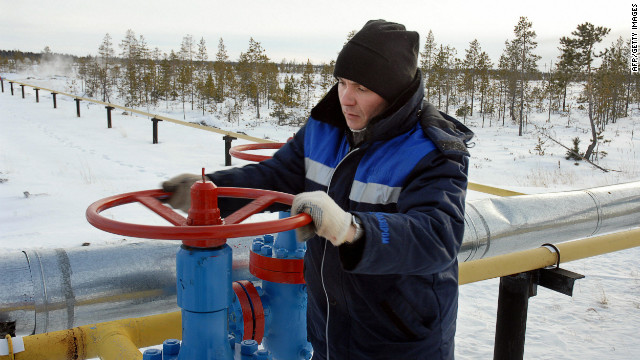
- Commission opens an investigation into suspected market abuses by Gazprom.
- EU officials raised concerns after gas prices increased in many parts of Europe.
Brussels (Financial Times) -- The European Commission, the EU's executive arm, has opened a formal investigation into suspected market abuses by Gazprom a year after Brussels launched surprise raids at the offices of the Russian energy company and its customers in central and eastern Europe.
The commission's antitrust authorities are focussing specifically on whether Gazprom used its dominant position in the EU gas market to thwart competitors and push up prices in central and eastern Europe.
In a statement released on Tuesday evening, the commission confirmed the investigation, saying: "Such behaviour, if established, may constitute a restriction of competition and lead to higher prices and deterioration of security of supply."
Gazprom spokesman Sergei Kupriyanov said the EU had not informed the company about the announcement, and did not comment further.
The investigation -- depending on its outcome -- could potentially result in heavy fines or require Gazprom to overhaul its business practices across a wide area of the EU in order to comply with the bloc's antitrust rules.
It marks the latest chapter in the EU's tortured relationship with Gazprom, which supplies roughly a quarters of the gas the region consumes.
The EU has sought to address that dependence after supply cuts in 2006 and 2009 left thousands of citizens across south-east Europe without fuel in the middle of winter. The former Soviet republics that joined the EU in 2004 -- some of which rely entirely on Russia for their energy needs -- have been particularly vocal.
To Moscow's irritation, the EU has invested heavily in creating a corridor of pipelines that would one day carry gas from central Asia via Turkey, skirting Russia altogether.
The bloc has also passed a series of reforms to liberalise its patchwork energy market. The hope among policy makers is that an integrated market would allow participants to send supplies across borders more easily, lowering prices and making individual member states less vulnerable in times of crisis.
Moscow has objected to that policy -- particularly a measure that forbids a single company from both supplying gas to an individual market and controlling the local distribution.
The investigation could indicate that the commission has turned up some evidence from last year's raids suggesting that Gazprom has attempted to undermine those reforms.
The commission is probing, for example, whether Gazprom used export restrictions in its contracts to prevent customers in one EU country from selling excess gas supplies to another, according to people familiar with the matter.
They are also examining whether Gazprom forced customers to support its pipelines -- to the exclusion of rival projects -- and are focusing on its pricing policies.
EU officials' concerns were raised after natural gas prices increased in many parts of central and eastern Europe during the economic downturn -- a time when the slowdown in industrial activity would typically lead to a decline in prices. Gazprom's supply contracts in the region tend to be long-term and are indexed to oil prices.
The company has renegotiated contracts with some companies in western Europe after a spike in oil prices, but has refused to do so in the east.
The investigation will focus on its dealings in eight nations that were once under Soviet domination, and are now part of the EU: Bulgaria, the Czech Republic, Slovakia, Poland, Estonia, Lithuania, Latvia and Hungary.
Tiny Lithuania, which relies entirely on Russian gas, has been particularly active in calling for action from Brussels, according to people familiar with the matter. The country has been embroiled in a dispute with Russia over its plans to evict a Gazprom joint venture from the local market under the auspices of the EU liberalisation laws.
No comments:
Post a Comment